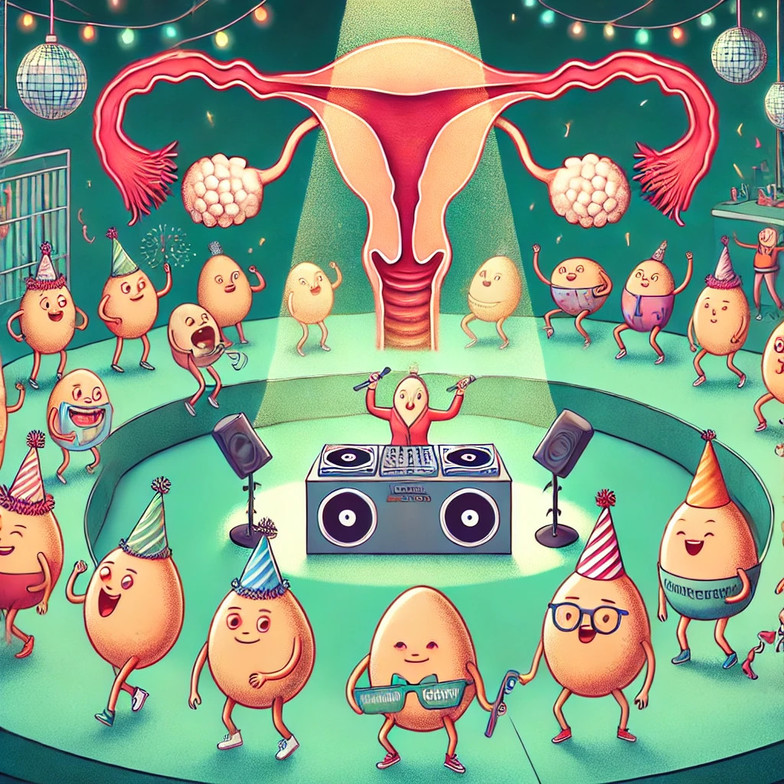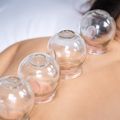
Ovarian Eggs and Menopause: The Final Countdown
From the moment an individual assigned female at birth (AFAB) is born, their ovaries contain a finite number of eggs, also known as oocytes. Unlike sperm in men, which are produced continuously throughout life, those with ovaries are born with all the eggs they will ever have. These eggs are stored in the ovaries, which also produce the hormones estrogen and progesterone, crucial for regulating the menstrual cycle and the entire reproductive system.
The Lifecycle of Ovarian Eggs
At Birth:
An infant assigned female at birth is born with approximately 1 to 2 million eggs. These eggs are in an immature state and are stored in the ovaries.
During Puberty:
By the time puberty is reached, the number of eggs has reduced to about 300,000 to 400,000. This reduction happens naturally through a process called atresia, where eggs that are not released during ovulation gradually degenerate and are absorbed by the body.
Throughout Reproductive Years:
Each month during the reproductive years, several eggs begin to mature, but usually, only one is released during ovulation. The rest of the eggs that began the maturation process that month will also undergo atresia. Over the course of reproductive life, only about 400 to 500 eggs will actually be released through ovulation. The rest will be reabsorbed by the body.
As Menopause Approaches:
As we age, the number of remaining eggs continues to decline. By the time we reach our late 30s or early 40s, the quantity and quality of eggs diminish significantly. This decline is accompanied by a reduction in the production of estrogen and progesterone because these hormones are produced by the follicles that contain the eggs. Fewer eggs mean fewer follicles, which in turn means less hormone production.
Menopause:
Eventually, the ovaries have very few eggs left, and the production of estrogen and progesterone drops sharply. When the ovaries no longer release eggs and hormone levels fall to a point where the menstrual cycle ceases, menopause is entered. Menopause is defined as the point at which an individual has not had a menstrual period for 12 consecutive months.
The Connection Between Egg Depletion and Hormone Levels
Estrogen and Progesterone: These hormones are primarily produced by the ovarian follicles that house the eggs. Estrogen helps regulate the menstrual cycle, maintain bone density, and support various bodily functions. Progesterone prepares the uterus for pregnancy after ovulation and balances the effects of estrogen.
Decline in Hormones: As the number of eggs decreases, so does the number of active follicles, leading to lower production of estrogen and progesterone. This hormonal decline is responsible for many of the symptoms associated with menopause, such as hot flashes, night sweats, mood changes, and vaginal dryness.
Embracing the Natural Transition
Menopause occurs as a natural result of the depletion of eggs in the ovaries. As the eggs diminish, so too does the production of the hormones estrogen and progesterone, leading to the eventual cessation of the menstrual cycle. Understanding this process is crucial, not only for demystifying menopause but also for recognizing the profound changes that occur within the body during this transition.
The journey of your ovarian eggs—from the millions present at birth to the few remaining as menopause approaches—mirrors the broader journey of life. Each stage, from puberty to the reproductive years, and finally to menopause, is marked by significant hormonal shifts that influence not just reproductive health but overall well-being.
For many, the approach of menopause can be accompanied by a sense of uncertainty or concern about the changes to come. However, by understanding the underlying biological processes, including the role of ovarian eggs, we can better prepare for and embrace this transition.
Menopause marks the end of the reproductive years, but it also heralds the beginning of a new phase of life—one that can be just as fulfilling and vibrant. With the right knowledge and support, it’s possible to navigate this change with confidence, maintaining a strong sense of health and well-being.
If you’re experiencing symptoms of menopause or simply want to learn more about how this transition might affect you, consider speaking with a healthcare provider who can offer personalized advice and care. Whether it’s through lifestyle adjustments, hormone management, or other interventions, there are many ways to support your body during this time.
Remember, menopause is not the end of your story—it’s the start of a new chapter, one where you can continue to thrive and live well. Understanding the connection between ovarian eggs and menopause is just one piece of the puzzle, and with this knowledge, you can take proactive steps toward a healthier, more balanced life.

Tanya Kelloway
Contact Me



